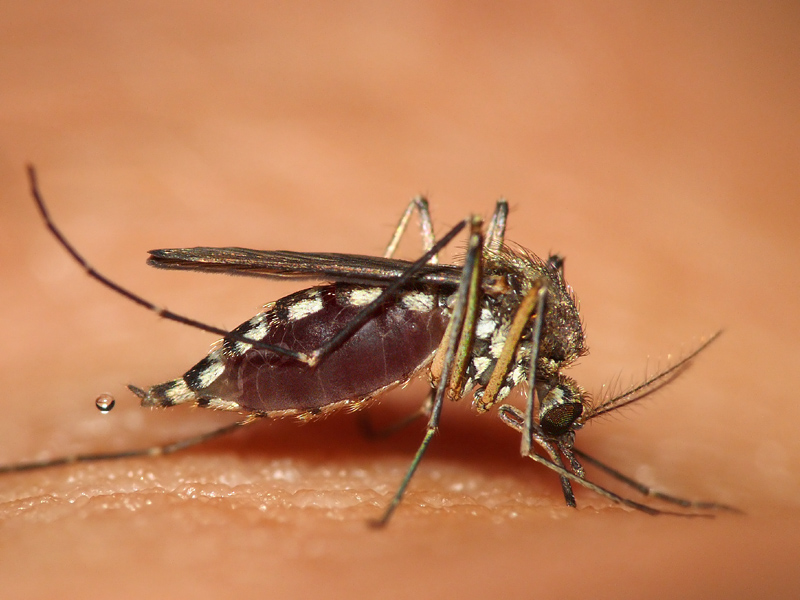Why mosquitoes prefer some people
Interview with
Ever wondered why some people just seem to be mosquito-magnets while  others escape unbitten? New research out this week suggests how attractive you are to mosquitoes is all down to your genes. Kat Arney went to see James Logan, from the London School of Hygiene and Tropical Medicine, to find out why...
others escape unbitten? New research out this week suggests how attractive you are to mosquitoes is all down to your genes. Kat Arney went to see James Logan, from the London School of Hygiene and Tropical Medicine, to find out why...
James - To test how attractive you are, we use an olfactometer. So, a Y-shaped tube essentially that allows us to place volunteers' hands inside the tube and we test the response of the mosquitoes to odours from volunteers' hands. So, if mosquitoes are attracted to the hands, they'll fly towards them and if they're not attracted, they'll fly away. So, in our study, we study twins essentially and we looked at the behaviour of mosquitoes to the odours of identical and non-identical twins. So the idea is that if there is a genetic, some sort of genetic control going on, I would be able to see that in the behaviour of the mosquitoes. So, the hypothesis was that identical twins would be similar in their level of attractiveness and non-identical twins would be different.
Kat - What did you find when you wafted these mosquitoes towards different people's hands?
James - In our test, where we looked at about 40 sets of twins, what we found in our experiment was that mosquitoes were equally attracted to odours from identical twins. When we subjected them to odours from non-identical twins, that correlation wasn't there. so, what that told us was that identical twins were similar in their level of attractiveness to mosquitoes which suggests that there is some sort of genetic control of how attractive you are to mosquitoes.
Kat - We hear a lot in the media about genes controlling things like our height, our IQ, our risk of diseases. How does this sort of level of attractiveness to mozzies compare?
James - When we do this experiment, we have to do a calculation for heritability. The values that we got were quite high. Astonishingly high actually, quite surprising, really at the sort of level of the same sort of values you would get for an IQ and height. So, it really was quite surprising. It seems to be very strong genetic component.
Kat - We also know things like high IQ. They're not necessarily just one gene. Is it that there's a gene for attractiveness to mosquitoes and some people have one version or another, or is it going to be more complicated than that?
James - At this stage, we don't know. So, we know that there's some sort of something going on genetically. The next stage of the study is then to identify the genes involved. There could be more than one gene that possibly, there probably is more than one gene involved. So, there's a lot of unanswered questions here but it's really exciting now that we can go on to the next stage and look at the genes.
Kat - So, once you do find this gene or genes that might be involved, what's the plan? Is it just to be able to test someone go bad like maybe don't go on holidays somewhere where there's mosquitoes?
James - Yeah. I mean, that is something that we could think about. You can have your genomes screened for all sorts of things nowadays and that could be one of the things that we look at, is your susceptibility to being bitten by mosquitoes. And that has more serious implications for populations and disease in endemic countries where malaria or dengue is a problem for example. So, we could look at the risk of certain populations and take into account how likely they are to be bitten when we do predictive modelling. But more than that, we could possibly develop a new technology. So, you might imagine taking a pill when you go on holiday which causes the body to naturally upregulate the production of these natural repellents which is what makes us unattractive. And that would minimise the need for putting topical repellents on the skin.
Kat - There's a lot of sort of folklore and old wives' tales about maybe you should eat garlic or drink different things to repel mosquitoes. Is there any truth in that, now we're getting towards the summer holiday season?
James - It would be good if there was. A lot of people have various anecdotes: Guinness is one of them, or gin, garlic, vitamin B. The truth is, there is no evidence that it can make you less attracted to mosquitoes. In fact, studies have been done which have shown that vitamin B for example has no effect on how attractive you are to mosquitoes. One study in 2010 showed that if you drank beer, it made you more attractive. I'm not sure whether that will stop people drinking beer when they go on holiday, but, yeah, the difference wasn't very big, so I wouldn't be too worried about it!










Comments
Add a comment